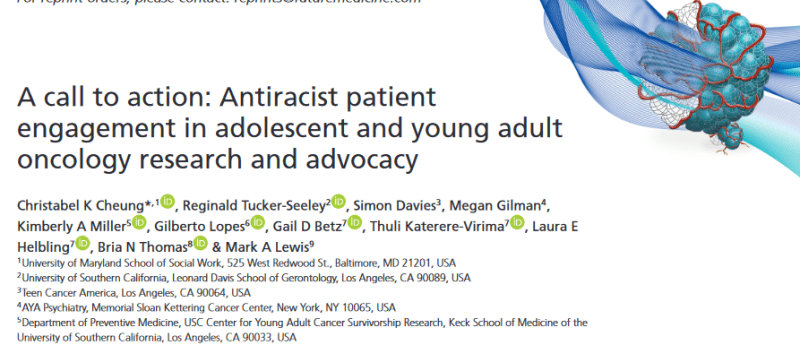A call to action: antiracist patient engagement in adolescent and young adult oncology research and advocacy

Abstract
Amidst the concurrent global crises of coronavirus disease 2019 (COVID-19), uprisings against Anti-Black racism and police brutality, as well as anti-Asian racism and violence, the field of medicine found itself simultaneously called upon to respond as essential workers in the public health devastation of COVID-19, and as representatives of healthcare institutions wrought with the impacts of systemic racism. Clinicians, researchers, and advocates in adolescent and young adult (AYA) oncology, must come together in authentic activism to begin the work of creating structural change to advance antiracist approaches to patient engagement in AYA oncology research and advocacy. Critical review of existing practices is needed to ensure that ethical and effective research methods are employed when engaging with racial and ethnic minority AYA patients with cancer, who may be particularly vulnerable and exploited in the current context.
Executive Summary:
- Amidst concurrent global crises of COVID-19, uprisings against anti-Black racism and police brutality, as well as anti-Asian racism and violence, the field of medicine found itself simultaneously called to respond as both essential workers and representatives of healthcare institutions wrestling with systemic racism.
- COVID-19 is proof-positive that massive structural changes in healthcare are possible with sufficient impetus to adapt to a crisis.
Antiracism & engaging AYAs in the conduct of research
- Antiracist patient engagement in the conduct of adolescent and young adult (AYA) oncology research requires approaches that value both antiracism and developmental appropriateness, given Black, indigenous, and people of color (BIPOC) AYAs’ dynamic psychosocial context, and their unique experience of expanded adverse childhood experiences (ACE) associated with racial and ethnic discrimination.
PCORI framework for patient engagement
- By employing an antiracist and developmentally-appropriate lens, we review current patient engagement practices in AYA oncology, and utilize the PCORI Framework for Patient Engagement as an organizing structure to discuss current strengths and unmet needs, and offer recommendations to promote greater inclusion of racial and ethnic minority AYA patient perspectives.
Token versus genuine patient engagement
- This review is centered on a shared value for genuine (as opposed to token) engagement with AYA patients across the cancer-research process, which requires shared values for both antiracism and developmental appropriateness given the dynamic nature of AYAs’ evolving psychosocial context.
Recommendations for topic selection & research prioritization
- Patient engagement must begin with the discussion of potential research topics, and extend to the highest levels of strategic planning within health systems and academic institutions.
- In all research, it must be incumbent on researchers to first identify whether there are racial or ethnic disparities that exist in the area of study.
- Issues of recruitment and access must be examined and addressed to improve the persistent lack of sociodemographic diversity among AYA patients who serve as advisors, and who provide patient-reported input.
Recommendations for proposal review: design & conduct of research
- To truly engage racial and ethnic minority AYA patients in designing and conducting research, investigators must fully educate and inform patients so they can make meaningful contributions.
- Honest and complete disclosure to AYAs about the costs and benefits of being a patient with cancer engaged with the oncology research process is necessary.
- Racial and ethnic discrimination is an expanded adverse childhood experience (ACE) that researchers must consider, as it may influence what is developmentally appropriate for BIPOC AYAs.
- Acknowledgement and responsiveness to power differentials between and within sociodemographic groups must be incorporated to enable true partnership in research.
- AYA oncology is culpable for token use of the same patient advocates repeatedly in representation of patient perspectives in the dissemination and implementation processes, which is akin to research bias from convenience sampling and produces results that are not representative of the entire population of interest.
- New incentives in academia are needed to ensure that research results are disseminated to the communities that will benefit from the findings, and BIPOC-embodied researchers can be instrumental to this process.
Recommendations for dissemination & implementation of results
- Dissemination of study results to particularly hard-to-reach communities typically demands additional resources and operational support.
Recommendations for evaluation
- Participation in evaluation often requires high engagement from patient advocates at a professional level that is usually not conducive to still-developing AYAs’ availability and capacity.
PCORI’s core principles of patient engagement
- Transparency-honesty-trust is the key principle for advancing genuine patient engagement over tokenism.




